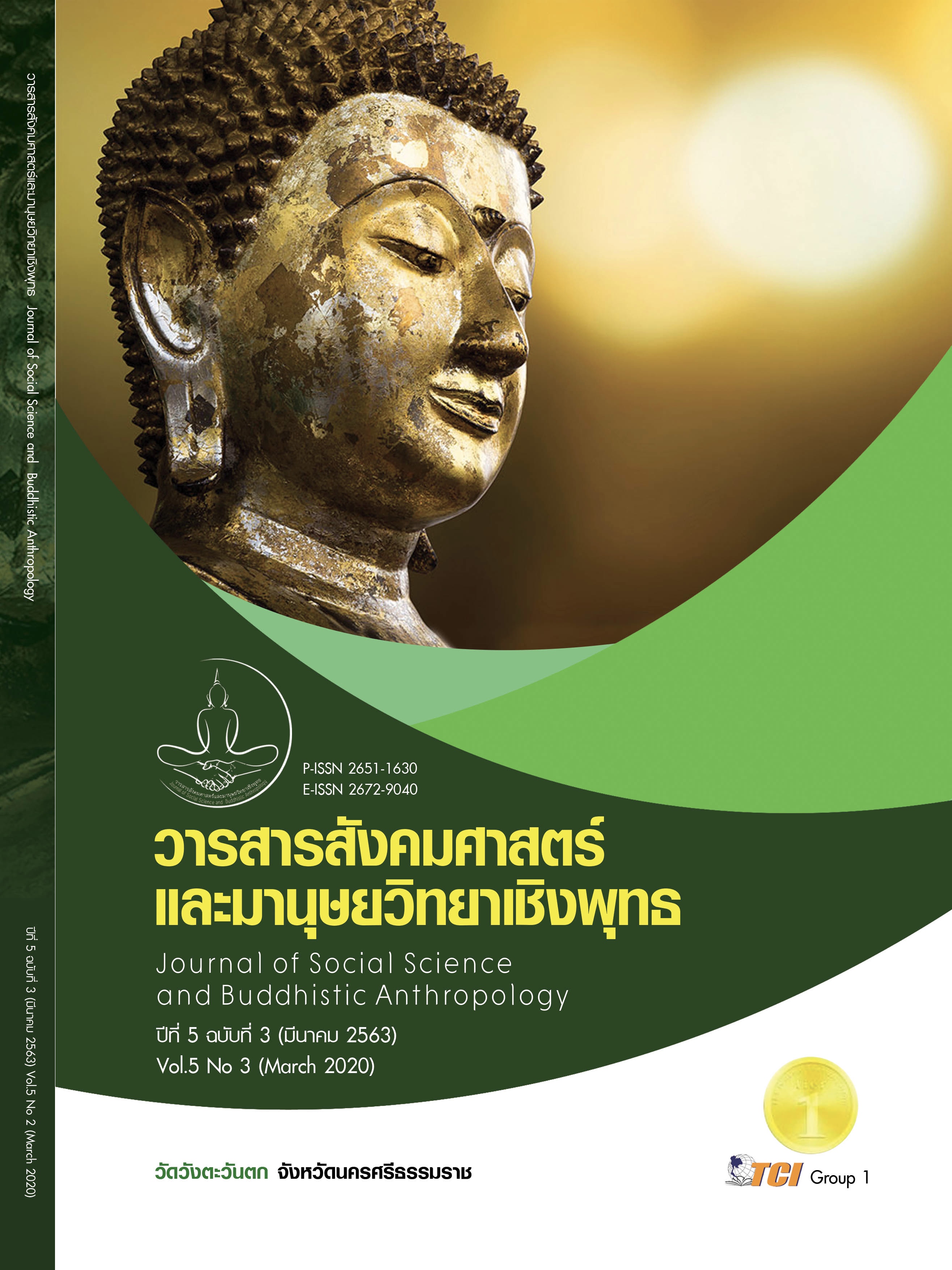THE DEVELOPMENT OF A TRAINING CURRICULUM TO ENHANCE SCIENCE LEARNING EXPERIENCE COMPETENCY BASED ON THE BRAIN - BASED LEARNING FOR EARLY CHILDHOOD TEACHERS UNDER SAKON NAKHON PRIMARY EDUCATIONAL SERVICE AREA OFFICE 1
Keywords:
Training curriculum, Teacher Competency, cience Learning Experience Management, Brain-Based LearningAbstract
The purposes of this research were to this research were to 1) to investigate the components of science learning experience competency based on the brain-based learning for early childhood teachers. 2) to develop a training curriculum; and 3) experimenting and evauating the results of experimenting in using the training curriculum. The process of This research was research and development. The samples were teachers teaching Kindergarten level 3 under Sakon Nakhon Primary Educational Service Area Office. 1) The findings were as follows: 1) The developed curriculum covered 8 components.The core competencies comprised three aspects: 1.1) knowledge covering five competencies with 25 indicators, 1.2) skills covering two competencies with four indicators, and 1.3) attributes covering three competencies with six indicators. 2) The effects after the curriculum implementation revealed that: 2.1) Teacher competency in terms of knowledge after the training was higher than the pre-training and achieved the preset criteria of 80 percent, indicating a statistically significant difference at the level of .05, 2.2) Teacher competency in terms of skills after the training was at a very good level ( = 4.86, S.D. = 0.07) and higher than the preset average values of 3.50, with a statistical significance of .05 level, and 2.3) Teacher competency in terms of characteristics after the training was higher than before the training at the statistical significance of .05 level. In addition, teachers showed their satisfaction level toward utilizing the training curriculum at the highest level ( = 4.67, S.D. = 0.32). This research was investigated to enhance early teachers’ competency that covered all three aspects. Because of the training curriculum was developed systematically, framework competencies ware according to need of early childhood teachers’ competencies. This include that the training curriculum can be used as a guideline to effective science learning experience management based on the brain-based learning for early childhood teachers.
References
กนกอร ปราชญ์นคร. (2550). การพัฒนาหลักสูตรการอบรมเสริมสร้างสมรรถนะข้าราชการประจำศูนย์ปฏิบัติการต่อสู้เอาชนะยาเสพติดจังหวัด. ใน รายงานการวิจัย. มหาวิทยาลัยศรีนครินทรวิโรฒประสานมิตร.
กระทรวงศึกษาธิการ. (2561). คู่มือหลักสูตรการศึกษาปฐมวัย พุทธศักราช 2560 สำหรับเด็กอายุ 3-6 ปี. กรุงเทพมหานคร: ชุมชนสหกรณ์การเกษตรแห่งประเทศไทย จำกัด.
กลุ่มนโยบายและแผนการจัดการศึกษา สำนักงานเขตพื้นที่การศึกษาประถมศึกษาสกลนคร เขต 1. (2561). รายงานข้อมูลสถิติบุคลากรในสังกัดสำนักงานเขตพื้นที่การศึกษาสกลนคร เขต 1 ประจำปีการศึกษา 2560. สกลนคร: กลุ่มนโยบายและแผนการจัดการศึกษา สำนักงานเขตพื้นที่การศึกษาประถมศึกษาสกลนคร เขต 1.
ดวงฤทัย โฮมไชยะวงศ์. (2557). การพัฒนารูปแบบการเรียนการสอนที่เน้นการโค้ชและการดูแลให้คำปรึกษาแนะนำเพื่อส่งเสริมสมรรถนะครูประถมศึกษาของนักศึกษาวิชาชีพครู. ใน รายงานการวิจัย. มหาวิทยาลัยศิลปากร.
เดือนเพ็ญพร ชัยภักดี. (2560). แนวคิดทฤษฎีเกี่ยวกับการพัฒนาหลักสูตร. เรียกใช้เมื่อ 25 ตุลาคม 2560 จาก https://sites.google.com/site/duanpenporn/ curriculum-development.
บุญชม ศรีสะอาด. (2553). การวิจัยเบื้องต้น. (พิมพ์ครั้งที่ 8). กรุงเทพมหานคร: บริษัทสุวีริยาสาส์น จำกัด.
ยมนพร เอกปัชชา. (2557). การพัฒนารูปแบบการนิเทศแบบเสริมพลังเพื่อเสริมสร้างสมรรถนะการจัดประสบการณ์การเรียนรู้วิทยาศาสตร์ของครูปฐมวัย. ใน รายงานการวิจัย. มหาวิทยาลัยราชภัฏนครสวรรค์.
วัลลภา ขุมหิรัญ. (2560). การจัดการเรียนรู้วิทยาศาสตร์ปฐมวัย. เรียกใช้เมื่อ 25 ตุลาคม 2560 จาก http://swisacn.acn.ac.th/html_edu/cgibin/acn/ main_php/print_ informed.php?id_count_inform=188
สำนักงานคณะกรรมการการศึกษาขั้นพื้นฐาน. (2557). รายงานผลการดำเนินงานโครงการ “บ้านนักวิทยาศาสตร์น้อย ประเทศไทย”. กรุงเทพมหานคร: ชุมชนสหกรณ์การเกษตรแห่งประเทศไทย จำกัด.
__________. (2560). หลักสูตรการศึกษาปฐมวัย พุทธศักราช 2560. กรุงเทพมหานคร: ชุมชนสหกรณ์การเกษตรแห่งประเทศไทย จำกัด.
อัญชลี สาระรัตนา. (2554). การประเมินความต้องการที่จำเป็น (Needs Assessment) เพื่อการพัฒนาหลักสูตรและการเรียนการสอน Need Assessment for Curriculum and Instruction Development. วารสารศึกษาศาสตร์ มหาวิทยาลัยขอนแก่น, 34 (1-2),9-20.
Akerson, Vslarie. (2004). Designing a Science Methods Course for Early Childhood Preservice Teachers. Journal of Elementary Science Education, 6(2), 19-32.
Aypay, A. (2009). Teachers’ Evaluation of Their Pre-Service Teacher Training. Educational Sciences:theory and practice, 9(3), 1113-1123.
Bandura, A. (1977). Social learning theory. Englewood Cliffs, NJ: Prentice Hall.
Brun, Judy K. (1997). Leadership Development Curriculum for Family and Consumers Sciences Under graduates. In Dissertation Ph.D. (Guidance & Counseling). State University.
Caine, Renate. N. & Caine Geoffrey. (1991). Making connections Teaching And The Human Brain. Virginea: ASCD: Association.
Cepeda, Linda F. (2009). Effects of Participation in InQuiry Science Workshops and Follow -up Activities on Middle School Science Teachers Content Knowledge Teacher -held Misconcepttions and Classroom Practices . Denver: The faculty of Natural sciences and Mathematics University of Denver.
Hopkins, D. & Antes, C. (1990). Classroom measurement and evaluation. Illinois: Publishers, Inc.
Piaget, J. (1971). The theory of stages in cognitive development. New York: Mc-Graw-Hill.
Seefeldt, C.& Barbour, N. (1998). Early Childhood Education: An Introduction. Ohio: Charles E. Merrill.
Uvis, J.P., & M. T. Grey. (1995). The Anatomy of a Competency. Journal of Nursing Staff Development, 11(5), 247-252.









